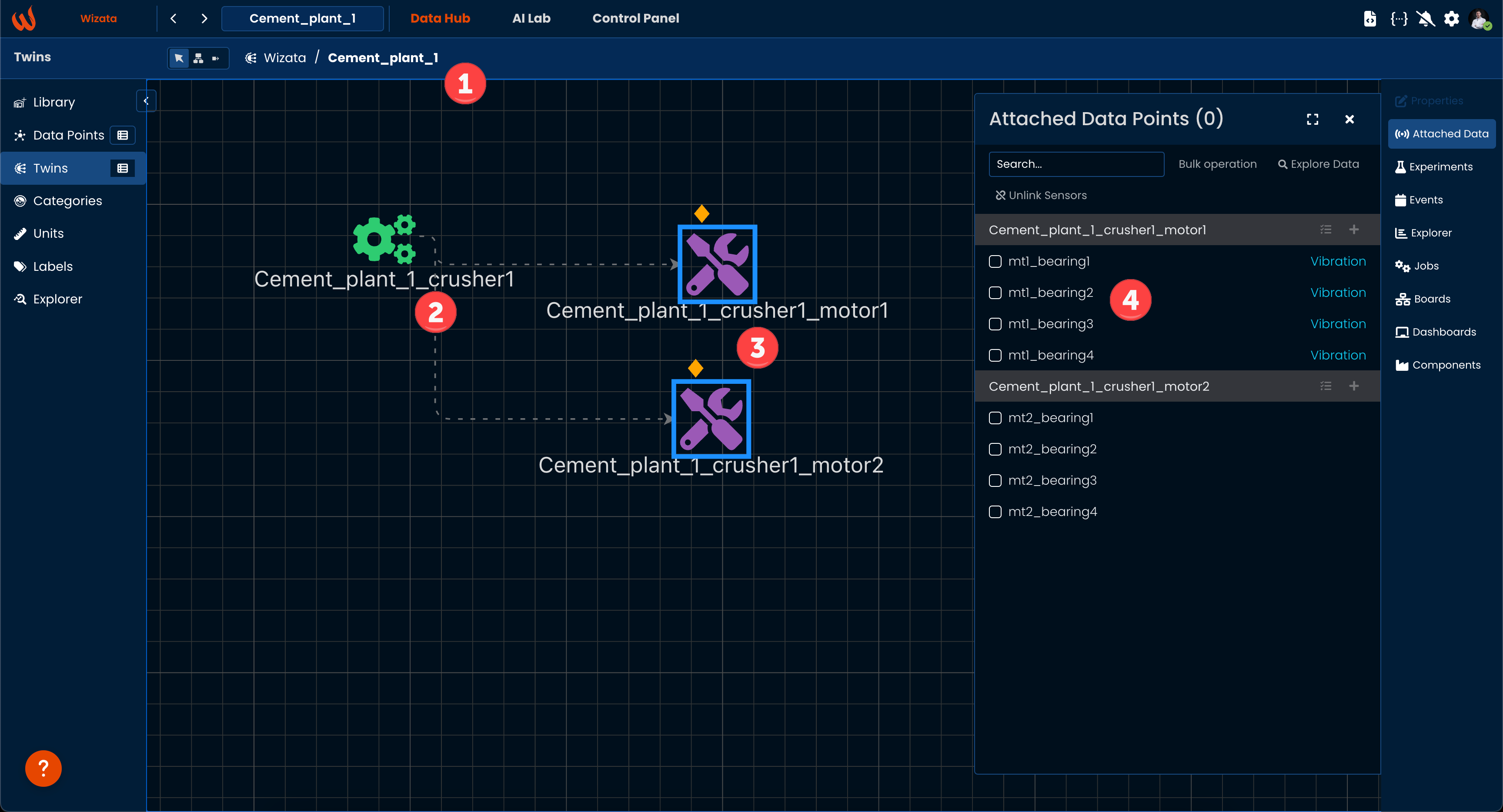Tutorial: Create Twin from tags list
Organizing the Data Hub from scratch can be challenging in the case a complete production line or plant is connected to the application. With Wizata API, this processed can be automatized to generate all the organization with a few lines of code.
Data schema
Wizata organizes process data with 3 types of items: Areas, Machines, Equipment. This hierarchy should be respected when digitizing a process. According to that, a simple table can be used as a starting point to create that hierarchy for the data sample sample data file from GitHub. Each datapoint must be attributed to a specific twin item, which can also be defined from that table:
| area | machine | equipment | datapoint |
|---|---|---|---|
| Cement_plant_1 | crusher1 | motor1 | mt1_bearing1 |
| Cement_plant_1 | crusher1 | motor1 | mt1_bearing2 |
| Cement_plant_1 | crusher1 | motor1 | mt1_bearing3 |
| Cement_plant_1 | crusher1 | motor1 | mt1_bearing4 |
| Cement_plant_1 | crusher1 | motor2 | mt2_bearing1 |
| Cement_plant_1 | crusher1 | motor2 | mt2_bearing2 |
| Cement_plant_1 | crusher1 | motor2 | mt2_bearing3 |
| Cement_plant_1 | crusher1 | motor2 | mt2_bearing4 |
The data table indicates that there are 8 measures of bearings vibrations, on 2 motors located in 1 crushing machine, located in a cement plant.
Data Hub programmatic creation
A simple loop can navigate through the above table, create the twin items in the Data Hub, and attach the related datapoints to the created twin entities. The following code iterates through areas, machines, equipment and creates related twin units and datapoints.
The above table must be saved into a .csv file in order to execute the code bellow.
datahub = pd.read_csv("datahub_bearings.csv")
areas = datahub["area"].unique()
machines = datahub["machine"].unique()
equipments = datahub["equipment"].unique()
for area in areas:
# Create area twin item
area_twin = wizata_dsapi.Twin(
hardware_id=area,
name=area
)
# Upload twin item to Data Hub
try:
wizata_dsapi.api().upsert_twin(area_twin)
except Exception as e:
print(e)
continue
temp_area = datahub[datahub["area"] == area]
machines = temp_area["machine"].unique()
for machine in machines:
# Create machine twin item
machine_name = area + "_" + machine
machine_twin = wizata_dsapi.Twin(
hardware_id=machine_name,
name=machine_name,
parent_id=area_twin.twin_id
)
try:
wizata_dsapi.api().upsert_twin(machine_twin)
except Exception as e:
print(e)
continue
# Filter equipments for this machine
temp_machine = temp_area[temp_area["machine"] == machine]
equipments = temp_machine["equipment"].unique()
for equipment in equipments:
# Create equipment
equipment_name = area + "_" + machine + "_" + equipment
equipment_twin = wizata_dsapi.Twin(
hardware_id=equipment_name,
name=equipment_name,
parent_id=machine_twin.twin_id
)
try:
wizata_dsapi.api().upsert_twin(equipment_twin)
except Exception as e:
print(e)
continue
# Filter datapoints of that equipment
temp_equipment = temp_machine[temp_machine["equipment"] == equipment]
for datapoint in temp_equipment["datapoint"]:
# Update existing datapoint
try:
dp = wizata_dsapi.api().search_datapoints(hardware_id=datapoint).results[0]
dp.twin_id = equipment_twin.twin_id
wizata_dsapi.api().upsert_datapoint(dp)
# Create datapoint if not existing yet
except Exception as e:
print("Datapoint doesn't exist yet, creating...")
dp = wizata_dsapi.DataPoint()
dp.hardware_id = datapoint
dp.name = datapoint
dp.twin_id = equipment_twin.twin_id
wizata_dsapi.api().upsert_datapoint(dp)
print(f"Created {area}, {machine}, {equipment} and attached datapoints")After executed, the result can be observed directly on the Wizata Data Hub, with:
- Root twin corresponding to "area" field from the table
- Crusher 1 created from "machine" field
- Motor 1 and 2 created from "equipment" fields
- Datapoints attached to corresponding equipment

Updated 4 months ago